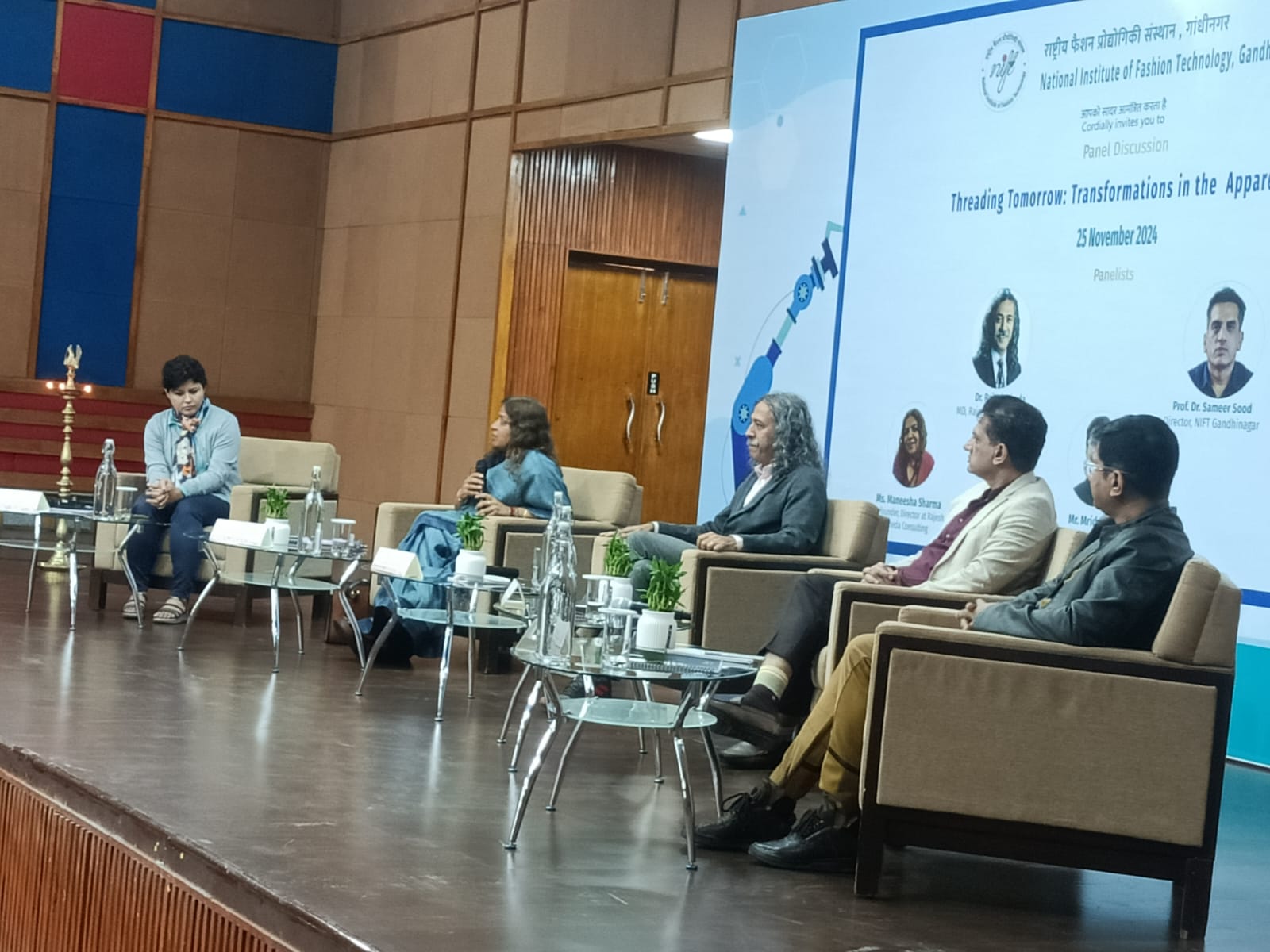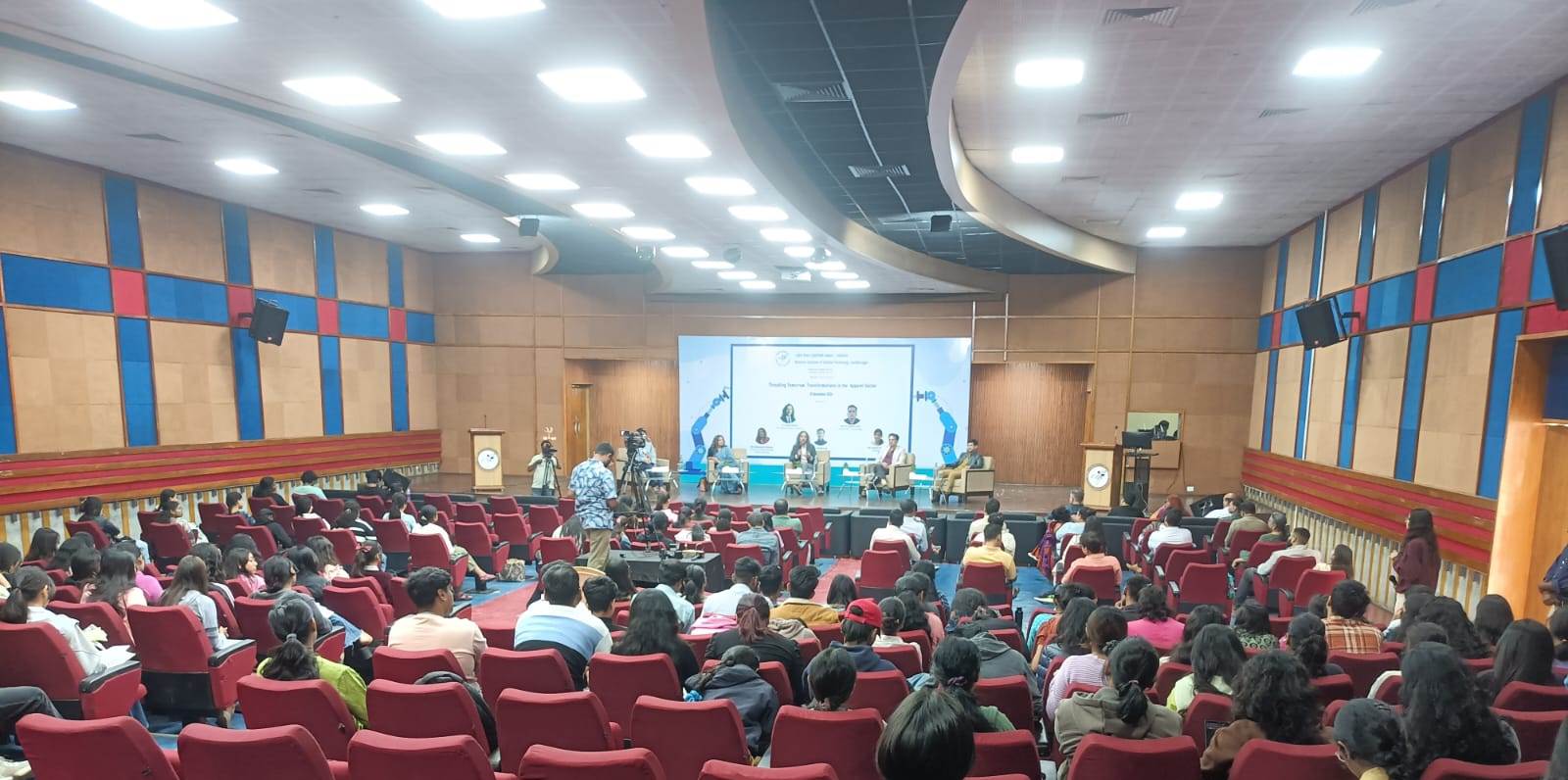Ministry of Textiles
NIFT Gandhinagar successfully conducted a panel discussion
Posted On:
25 NOV 2024 7:57PM by PIB Ahmedabad
NIFT Gandhinagar successfully conducted a panel discussion titled Threading Tomorrow: Transformations in the Apparel Sector. This thought-provoking session explored critical trends and challenges within the Indian apparel industry, offering valuable insights for students and industry professionals to shape the future of fashion and textiles. The programme was conducted under the overall supervision of Dr. Sameer Sood, the Director of NIFT Gandhinagar. The esteemed panel members participated in the discussion:

Dr. Rajesh Bheda, Managing Director of Rajesh Bheda Consulting, brought over three decades of expertise in performance enhancement and sustainable solutions within the fashion industry, sharing insights on productivity, quality, and worker welfare. Dr. Sameer Sood, the Director of NIFT Gandhinagar, academician and experienced leader, he is known for his expertise in CSR, operations, and quality assurance. Mr. Mridul Das, Managing Director of Sportskin International and its visionary Founder and CEO, highlighted his significant contributions to India’s sportswear industry, including his work with Adidas and the Khelo India project. Ms. Maneesha Sharma, Co-founder and Director of Rajesh Bheda Consulting, with 35 years of extensive industry experience, emphasized the importance of prioritizing people, planets, and passion as essential drivers of sustainability and success.

The event commenced with the ceremonial lighting of a lamp, symbolizing an auspicious start to the proceedings. Ms. Ettishi Rajput, Assistant Professor, skillfully moderated the session.
The discussion addressed strategies to enhance productivity and quality in India’s apparel sector, which are critical for improving global competitiveness. The panelists explored the integration of innovation and technology to streamline processes and reduce costs without compromising quality standards. They also examined challenges posed by Gen Z’s unique workforce dynamics, such as their preference for meaningful work, tech-savviness, and demand for flexibility. Retention strategies to engage this dynamic demographic were a focal point, with panelists emphasizing inclusivity, providing skill development opportunities, and fostering a sense of purpose. Reiterating a modern, employee-centric approach is crucial for businesses to reduce turnover rates and ensure long-term success.
Prof Dr Sameer Sood Director of NIFT Gandhinagar said that apparel and textiles industry is the oldest in the world, controlling 40% of the market before Christ. However, it now only accounts for 4% of the entire industry. As fashion professionals, they need to play a bigger role in nation-building. The majority of students, particularly those from the tech department, are not interested in manufacturing and prefer to go into retail. A recent survey revealed that 60% of students from the technology department go into the retail business, while only 25-30% would like to contribute to production and operations. This is concerning as India needs to be competitive in terms of efficiency and quality goods production. The MFM program aims to guide students to remain in the manufacturing sector. However, there is a demand and supply between the marketplace and the students' aspirations. Technologists who enter manufacturing have risen to high ranks globally, but the path is not well-laid or comfortable in the initial period. In terms of motivating students towards manufacturing, they acknowledge that there are two sides to the story: going to retail and having product knowledge. In the long run, manufacturing can provide a better opportunity for women to succeed in the industry. The retail sector faces direct competition from IIMs and other management institutions, while the apparel industry has no competitors. The choice is yours whether to be in the niche sector, learn something you have learned, or do something generic in nature. Product and manufacturing knowledge are essential for long-term success and satisfaction.
Dr. Rajesh Bheda, CEO and MD, Rajesh Bheda Consulting said that A TED talk by a US professor has mapped the long-term success factors of all professionals across various fields, including art, defense, sports, business, and various walks of life. One key factor that has made a difference is the importance of addressing the demand and supply in the industry. The speaker emphasizes the importance of grit, which is the ability to survive difficult situations and continue to excel in all walks of life. They suggest that sticking around can lead to success in certain professions, such as manufacturing for global brands. They also highlight the potential for Niftians to shape the future of the industry by creating organizations that create more attractive working conditions and support for women.
Ms. Maneesha Sharma, Director at Rajesh Bheda Consulting said addressed the question of how to ensure a women-friendly workplace for Gen Z, given that 70% of NIFTians are girls. They believe that the industry should understand the needs of women in both their work and personal lives, and that everyone contributes to the industry. They encourage the student community to take their voice forward in writing articles and projects that focus on women's career progression. The speaker also emphasizes that the buyer mandate should not be the deciding factor in the industry, as Niftians form a significant portion of the workforce. The economy would benefit from women not leaving jobs and taking breaks to raise their children, and the industry should become more women-friendly. The speaker believes that women in every aspect can contribute tremendously to the industry, but it starts with the people sitting across from them. The industry will listen to the speaker's concerns and will listen to their voices.
Mr. Mridul Das, Founder and CEO of Sportskin International said that initial phase of a career in the industry can be challenging due to the need to learn various aspects and processes. However, working with practical problems and developing knowledge about the product and factory processes can help move forward in one's career. The working culture environment is crucial as it allows employees to participate in activities and contribute positively. Organizations like factories and export houses are looking into improving the working culture for all types of people, especially for girls and females.
This environment provides the right balance for employees to work happily and contribute. The journey from knitting design at NIFT to retail involves understanding product development, design, and business aspects. This experience helps individuals become confident enough to pursue their own careers. However, entering the retail sector will likely require a long-term career path, as it is more data-driven and less competitive than other sectors. In the retail sector, students often work in sales roles or as stylists. Utilizing deep learning in a practical way will benefit both the individual and the industry. It is important to think deeply about the future and see what is tangible for oneself and the industry as a whole. As AI and other institutes and organizations enter the retail space, it is essential to consider how to adapt and grow in the industry.
The panelists offer advice and mantras for students interested in starting a startup in the garment manufacturing sector. They encourage students to visualize ideas, not let anything hold them back, and to try again and again. They encourage sharing their thoughts with the industry and writing in blogs to create opinion and influence. The panelists emphasize the importance of articulating ideas early on and sharing them with the industry. They also encourage sharing experiences and good practices in the industry, as nothing succeeds like success. The panelists emphasized that opportunities are available for everyone, regardless of their entrepreneurial nature or career goals. The panel also mentions the garment manufacturing sector as the most priority sector for startups in India, with a target of 40 billion exports and a growing domestic market. The government, institutions, and the entire ecosystem are supportive of startups in this sector. The panelists encouraged students to try and succeed in their entrepreneurial journey.
The session concluded with an exploration of opportunities in the domestic and international markets and advice for aspiring entrepreneurs. Panellists encouraged students to articulate their ideas, engage with the industry, and leverage their knowledge to drive innovation and influence. The event provided an invaluable platform for students to interact with industry experts, fostering conversations that paved the way for innovative solutions and a deeper understanding of the apparel sector’s future.
AP/IJ/GP/JD
(Release ID: 2077057)
Visitor Counter : 159